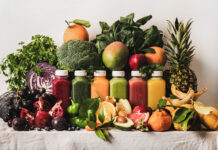
By Matt Colmerauer, Director of Procurement and Logistics for LiDestri Foods
The hallmark of a great food industry relationship is collaboration. In a fast-paced environment with hundreds of ingredients, many with a short shelf life, it’s imperative suppliers and co-packers work seamlessly to keep lines running and ship products to meet customer demands. A food manufacturer with a robust supplier portfolio ensures a seamless supply chain.
Getting started
A manufacturer-supplier partnership might begin by signing up a vendor as part of a business-resumption scenario. As the supplier learns the manufacturer’s business and schedules, the food maker’s procurement team should add checkpoints to vet the growing relationship. The procurement team can assess, for instance, delivery performance, the grade of produce, quantity, and the accuracy of invoices.
Food manufacturers can kick start collaboration by explaining their current specifications, forecasts, and lead times to suppliers, while confirming the supplier’s flexibility to expedite or pause deliveries based on needs. Food manufacturers should also create scorecards to track a supplier’s performance vis-à-vis quality, cost, and delivery.
By way of background, my employer views quality, cost, and delivery as the three legs on a stool. If a supplier’s performance falls short in one area, or worse yet doesn’t produce at all, the stool falls over. For example, in preparing to run a given product, if just one ingredient is late, it may delay or stop production. A delayed delivery can impact costs downstream, especially when a product includes something like cream that a manufacturer might dispose of if other ingredients don’t arrive on time. Suppliers, in turn, should continually convey their grasp of a manufacturer’s needs, including any limitations they have affecting production timetables. At our company, when a supplier consistently delivers on each leg of the stool per our scorecard, they become eligible to become a strategic supplier.
For example, my employer, a contract manufacturer of food and beverages, has forged a 30-year relationship with a company that processes, packages, and distributes sucrose. Our relationship began when looking for a reliable supplier of sugars. The supplier we chose was a natural fit because it had: operations in our region, rail sidings, and a fleet of tanker trucks enabling them to control the ingredients all the way through to delivery.
Open lines of communication can build a long-lasting partnership
Our sucrose supplier’s dedication to our relationship is defined by simple but uncommon ways of working: flexibility, transparency, and understanding. For starters, they do what they say they’ll do. Their commitment to us has helped them increase annual deliveries 20-fold over the years we’ve worked together.
Another example of their commitment to us is their ability and willingness to deliver our ingredients when and where we need them, which can be a moving target. Our sucrose supplier believes that responding in a flexible way adds value to delivering first-rate sucrose. They also execute on the logistics piece by tapping their own drivers to deliver what we need. For instance, they can quickly contact their drivers for their status and precise delivery time and relay that to us, so we can make real-time decisions on production. We repeatedly turn to them because they are transparent about the cost of transporting sucrose to us. What’s critical for us is relying on them to produce the ingredients and directly manage transportation to our door. A supplier that can include delivery with its own rail cars and truck fleet as part of its product mix differentiates itself.
Teamwork brings certainty from uncertainty
Collaborating frequently with our suppliers through casual phone calls and more formal, in-person meetings also helps ease the effects of extreme weather. When manufacturers and suppliers grow familiar enough to simply pick up the phone and get a quick answer about, say, a scheduling change, both sides can hurdle roadblocks. Like many food manufacturers, we’ve had to go to other geographic regions and create different processes to secure superior ingredients. While this adds complexity to an already multifaceted supply chain, it’s necessary if we’re going to deliver our customers the high-grade products they expect.
Consider the growers in the Pacific Northwest from whom we typically purchase onions to make our pasta sauces and salsas. They experienced extreme heat during Oregon’s 2021 growing season. This affected yields. And we had to look at alternate areas (and even countries) from which to obtain ingredients to make up shortfalls. By staying very close with a strategic supplier, as we did, manufacturers can let growers know what’s needed. They, in turn, can incorporate this before planting vegetables like onions. We’re also in constant contact with suppliers to get data on estimated yields per acre, throughout the growing season. Onions are a crop our suppliers traditionally store, dice, and deliver as we need it. The extreme heat in 2021 caused some stored onions to begin spoiling before our supplier could dice them for us. So, as soon as our supplier realized the produce was going bad, they worked with us to put in place a procedure to process all the onions in advance and hold an inventory of what we needed but didn’t immediately require. Open communication and flexibility helped us collectively rework the process, enable a continuity of supply, and prevent a shortage.
Unpredictable weather also creates new dynamics for us and our interconnected web of suppliers to produce one jar of our sauce. As temperatures rose in California this spring, last winter’s snowpack quickly became torrents of water. The deluge affected tomato growers who had to put their crops in the ground three to four weeks later than normal. With monthly, even weekly, conversations between our tomato suppliers and purchasing team, we’re closely watching how the season is unfolding via the predicted yields per acre and caliber of produce. We then update our customers.
Diversify to mitigate issues
When the manufacturer-supplier relationship runs aground, the root cause is typically with one of the legs on our supplier stool. If, for example, the Brix measurement on a sucrose delivery is less than what we need for a recipe, especially if we’re working with a just-in-time process, a quality issue like that can halt one of our lines. That triggers added costs. A way to mitigate challenges is for manufacturers to sort their suppliers into categories like partners, strategic suppliers, and transactional vendors. As a manufacturer develops its relationships, managers can determine when suppliers move up or down the hierarchy based on their fit and function.
Take tomatoes and onions for example. A manufacturer could have a couple of key strategic partners that handle planting, growing, harvesting, storing, packaging, and shipping (i.e., the whole spectrum) along with some transactional suppliers that help with the ebb and flow created by, say, consumer demand, weather, or the economy. Some of the transactional partners will have the chance to prove themselves and step into a strategic relationship where a manufacturer can evaluate them. Ultimately, a supplier becomes strategic because they add value (e.g., offering various pack sizes to create efficiencies). For some strategic suppliers, adding value could be offering transparent pricing or elasticity with contracts. Let’s say my company didn’t need as much volume in a particular contract period. A strategic supplier might look at that situation and adjust or amend our contract, so it’s not punitive for us when we can’t buy as much as we initially signed up for. If the relationship is built on trust, then we’ll remember those favorable terms, the supplier’s flexibility, and make up ground later.
When you invite a supplier to understand your business and they accept that invitation, they begin to see the greater context for what’s needed and why. Suppliers like this can then recommend products or services to augment what you’ve already purchased. They can see where the future of your business is going and help you get there — it’s a route to solving problems and achieving better quality.
 Matthew Colmerauer is Director of Procurement and Logistics for LiDestri Foods, a leading private label and contract manufacturer of food and beverages. Colmerauer earned his master’s degree in global operations management from Clarkson University.
Matthew Colmerauer is Director of Procurement and Logistics for LiDestri Foods, a leading private label and contract manufacturer of food and beverages. Colmerauer earned his master’s degree in global operations management from Clarkson University.








![[eBook] Tales of Triumph from the Factory Floor, Vol. 2](https://foodindustryexecutive.com/wp-content/uploads/2025/04/FOTFL_Tales_of_Triumph_Vol_2_Cover-1-324x160.jpg)